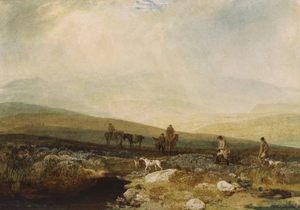
Walter Fawkes
Encyclopedia

Yorkshire
Yorkshire is a historic county of northern England and the largest in the United Kingdom. Because of its great size in comparison to other English counties, functions have been increasingly undertaken over time by its subdivisions, which have also been subject to periodic reform...
landowner, writer and Member of Parliament
Member of Parliament
A Member of Parliament is a representative of the voters to a :parliament. In many countries with bicameral parliaments, the term applies specifically to members of the lower house, as upper houses often have a different title, such as senate, and thus also have different titles for its members,...
(MP) for Yorkshire
Yorkshire (UK Parliament constituency)
Yorkshire was a constituency of the House of Commons of the Parliament of England from 1290, then of the Parliament of Great Britain from 1707 to 1800 and of the Parliament of the United Kingdom from 1801 to 1832...
from 1806 to 1807.
Biography
Walter Fawkes was born at Hawkesworth Hall, near GuiseleyGuiseley
Guiseley is a small town in the City of Leeds metropolitan borough in West Yorkshire, England. Situated south of Otley and Menston, it is a suburb of north west Leeds. At the 2001 census, Guiseley together with Rawdon had a population of over 21,000. The A65, which passes through the town, is the...
as Walter Ramsden Hawkesworth and inherited Farnley Hall
Farnley Hall (North Yorkshire)
Farnley Hall is a stately home in Farnley, North Yorkshire, England. It is located near Otley. The original early seventeenth century house was added to in the 1780s by John Carr, who also designed Harewood House...
in 1792, at which point he assumed the surname Fawkes like his father, Walter Beaumont Fawkes, the head of an old West Riding family, before him.
Early in life Walter Fawkes became an active member of the advanced section of the whig party, being M.P. for the county of York from 1806 to 1807. He took a prominent part in the anti-slave trade movement, and spoke effectively in the debate which preceded the passing of Wilberforce
William Wilberforce
William Wilberforce was a British politician, a philanthropist and a leader of the movement to abolish the slave trade. A native of Kingston upon Hull, Yorkshire, he began his political career in 1780, eventually becoming the independent Member of Parliament for Yorkshire...
's measure. In 1823 he filled the office of High Sheriff of Yorkshire
High Sheriff of Yorkshire
The High Sheriff of Yorkshire was an ancient High Sheriff title originating in the time of the Angles, not long after the invasion of the Kingdom of England, which was in existence for around a thousand years. A list of the sheriffs from the Norman conquest onwards can be found below...
.
Fawks was a man of varied intellectual gifts, a cultivated writer, and, above all, a great lover and patron of the fine arts. In 1810 he published The Chronology of the History of Modern Europe, in 1812 a Speech on Parliamentary Reform, and in 1817 The Englishman's Manual; or, a Dialogue between a Tory and a Reformer; in all of which he set forth his political views and leanings with much perspicuity.
Fawks is be best remembered, however, as the intimate friend and one of the earliest patrons of J.M.W. Turner, the artist. Turner had a welcome and a home at Farnley Hall, Fawkes's Wharfedale residence, whenever he chose to go, and used to spend months at a time there. Mr. Ruskin has borne eloquent testimony to the influence of Fawkes, Farnley, and Wharfedale on the genius of Turner, and the Turner collection still existing at Farnley Hall contains about two hundred of the artist's choicest works.
Fawkes was also a keen agriculturist. He did much towards the improvement of his estates, and was very successful as a breeder of cattle, his shorthorns being known abroad as well as in England. In conjunction with Mr. Jonas Whitaker of Burley-in-Wharfedale and the Rev. J. A. Rhodes of Horsforth he founded the Otley Agricultural Society, one of the first of its kind in England. The park which he formed at Caley Hall was stocked with red and fallow deer, zebras, wild hogs, and a species of deer from India.
Fawkes greatly enlarged the family mansion at Farnley, which he adorned with many collections. He married Maria, daughter of Robert Grimston of Neswick, and left a large family, dying in London on 24 October 1825, and being buried in the family vault at Otley.
Selected works
- Chronology of the History of Modern Europe (1810)
- The Englishman's Manual, or, A Dialogue between a Tory and a Reformer (1817)

